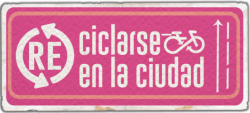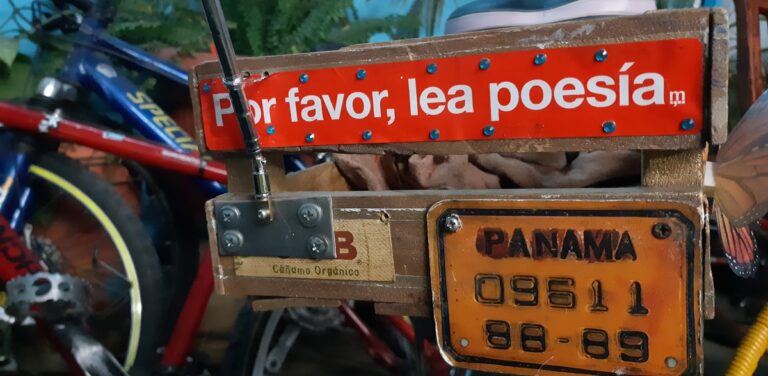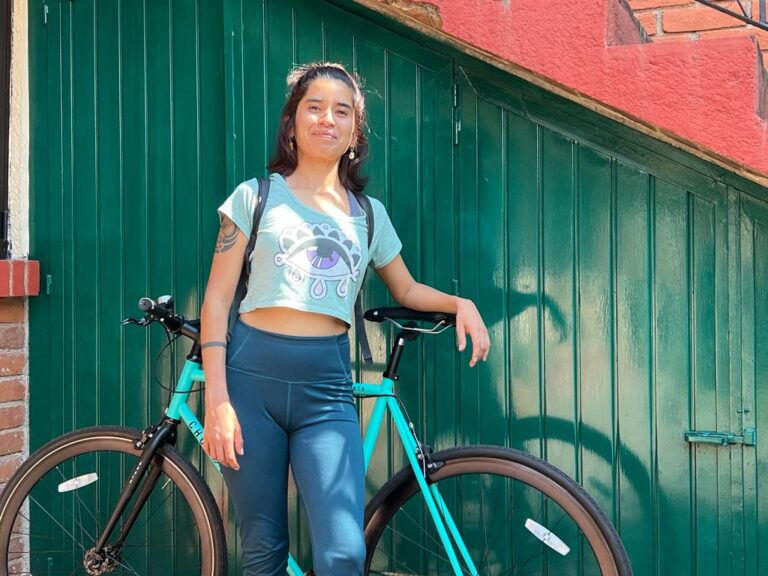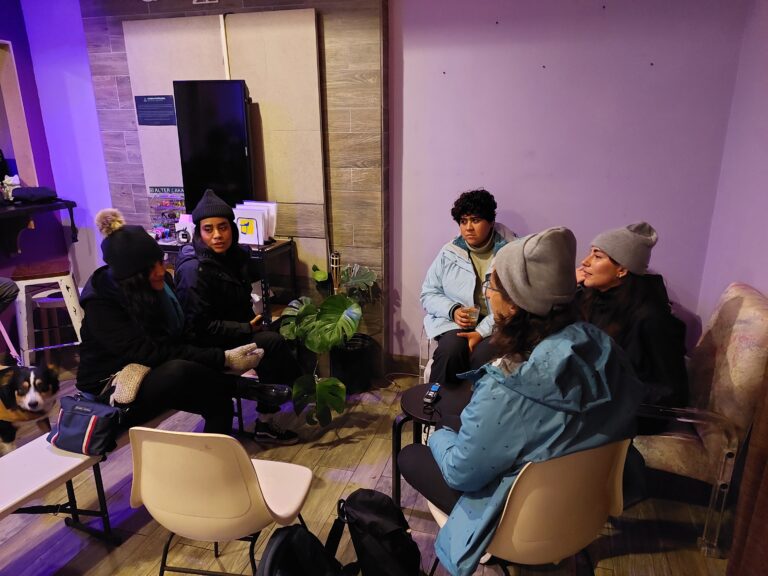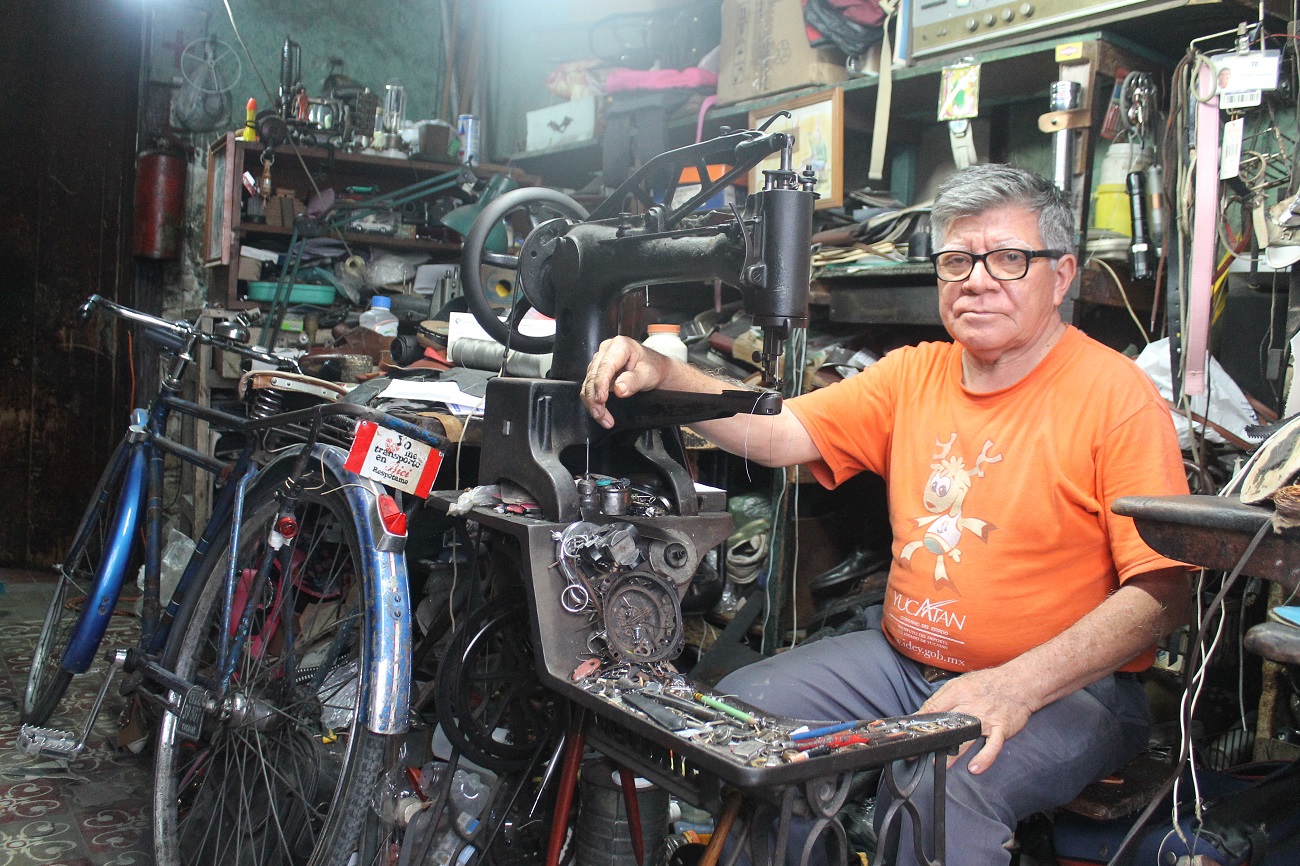
Gerónimo Borges
The Bicycle Is Enough
Mérida, Yucatán, February 6, 2020. Gerónimo Borges lives in Mérida's Centro Histórico (Historic Center). His home and workshop are located on the first block of the city, where he has been repairing and sewing shoes for more than 40 years. He also remembers a Centro Histórico where work, family life, commerce, mobility, and leisure were all part of a single harmonious community built on organic relationships. In telling his story, Gerónimo focuses his attention specifically on bicycles, which he appreciates and vehemently defends as a fundamental part of an urban area increasingly threatened by exclusionary zoning and development practices that are disconnected from the people who have traditionally inhabited it.
I was born in a town called Temax, but moved to Mérida when I was seven or eight years old; so, you could say that I'm Meridian. I live here in el Centro. I have always lived here in the city's first block, where my workshop has been for 40 years. I used to manufacture here. I had two machines like the one you see there. They were two Landis for shoes, but I sold one of them because there came a time when I stopped manufacturing. I used to have four people working while I was working on repairs. That was back when there was a lot of buzz around manufacturing. Between Saturday and Sunday, more than twelve hundred, fifteen hundred pairs of shoes were sewn. It was crazy. Every day was spent manufacturing. But suddenly, manufacturing went out of style, and I was left working repairs - alone - because honestly, repair isn't a business where you can have employees. To have employees, you have to charge a certain amount, and it doesn't pay well; here, work isn't paid for.
I don't remember when I learned how to ride a bike. I do remember that when I was around eight years old, they used to put me on an Admira bicycle, which is a German brand. The bicycle was all chrome-plated; it was beautiful. They took me to a tannery, where all the work was artisanal. Everything was handmade, and they used chucún, which is the bark of a tree. Since it's very astringent, very tight, they soak it in pools and put it on the leather to tan it. I remember when the chucún was fully-used and no longer served a purpose, they would throw it on the floor and put me on the bicycle. "Learn to ride!" the owner of the bicycle, who was a distant uncle, would say to me, and he would push me. And as a kid, I did it, but then I would fall on the husks of the chucún. That's why I remember - not because I got hurt, no - nothing ever happened to me. But time went by, and like every human being, I wanted to learn how to ride a bicycle well.
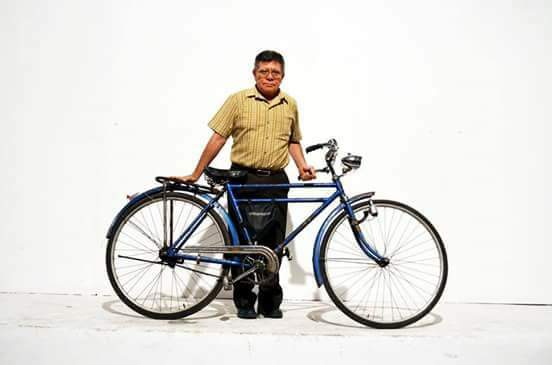
After that, I never stopped riding my bike. The first bicycle I had was given to me as a gift when I started high school. I have it there in the courtyard. I've wanted to fix it up because it has an Oxford frame, but I haven't had the time to. They gave it to me because I lived in la Cámara de Comercio neighborhood, and I had to take two buses to get to school. And when I did, I had to go twice a day. I had classes from seven to ten in the morning, and then you had to come back in the afternoon from two to five. It was crazy. Now it's better because it's continuous. Before it was broken up: you went and came back, and it was a waste of time. There were a lot of people who stayed at the high school. They stayed there, relaxed and everything. But for me, the bicycle was very useful because I would go home and come back, which gave me really good training, and from there I think I got the taste for racing.
Then I bought that bicycle over there; it's a Saeta. It was sold to me by a man who I think had an extra. It wasn't really good because the frame was cracked. But it was fixed. I think he sold it to me for 1,500 pesos. That's when I started training with the road bicycle. I fully dedicated myself to training. There was a time when I was biking eighty, ninety kilometers every other day. There came a point of time when I entered several 120-140-kilometer races: Mérida to Uxmal, Mérida to other cities. One time I came in second. Once. But for me, that was crazy; I was extremely proud to have won second place.
...we rode all five of us on a bicycle. My oldest son was about three years old, the middle one around a year or so, my wife sitting on the rack, and the youngest in my pregnant wife's belly. All five of us on the Oxford over there in the courtyard. That's why I have a soft spot for that bicycle.
The bicycle has been incredibly useful to me. I don't know how to drive a car. It's the truth - not even a motorcycle. I never got into it. For me, it's always been about bicycles. Even married, sometimes I tell people, we rode all five of us on a bicycle. My oldest son was about three years old, the middle one around a year or so, my wife sitting on the rack, and the youngest in my pregnant wife's belly. All five of us on the Oxford over there in the courtyard. That's why I have a soft spot for that bicycle. And just like that, the five of us would go to parks. My wife remembers it very well. We would go to el Parque de las Américas - where we went with you yesterday. We would take a roasted chicken that my wife made and we'd eat tacos. We'd go to el Centenario (the zoo) too. We always got around on bicycles. Back then, there wasn't as much traffic as there is now. This was back... look: my wife and I celebrated our fortieth-anniversary last year on July 14th. And well, my children are all grown up now. The oldest is about to turn forty, the other is in his thirties, and the other is thirty-six, somewhere around there. So, what I'm telling you is, thirty years ago, there wasn't the traffic that there is now. We had room to walk around.
Another reason I ride a bicycle nowadays is that I have osteoarthritis. My knees have some wear and tear. I feel bicycles help me, especially sporty bicycles. Why do they help? Well, because walking grinds the knees. On the other hand, riding a bicycle stretches them. Even when I get off the bicycle, I don't feel discomfort. Walking, I do. I walk three, four blocks, and I already feel pain. The doctor even told me so. I had an arthroscopy, and last December, they gave me three injections in each knee to alleviate some of the pain. The doctor told me:
—"Don't run, don't jump, and avoid the stairs. And I am going to suggest something to you: if you can ride a bicycle, go for it."
—"I'm going to try, Doctor," I told him.
I came back and told my wife:
—"You know what? The doctor discharged me. He advised me not to jump, not to run, and to avoid the stairs. Then he told me I can ride a bicycle, go for it."
—"And what did you tell him?"
—"Well, I told him I'm going to try."
—"If the doctor only knew that your limousine was already at the hospital's door waiting for you," she said.
Now that we're on the subject, Alex, I remember a certain gentleman... we used to call him el Negro Polanco. His last name is Polanco. He is a big guy, and he suffered from osteoarthritis. He complained about pain in his knee. I was newly married to my wife, and he would bring me his sandals to sew. He would bring thirty or forty pairs for me to make for him. He always came riding his bicycle - a twenty-speed bicycle. But he didn't pedal it. He would come with his feet on the ground and say to me: "The bicycle helps my knees a lot. I ride it sitting and push myself, and my knees don't bother me anymore." And when he was leaving, the same thing: he would get on the bicycle and ride away pushing himself. Now that I have this problem, I see that, yes, it does help, and I recommend it to people.
I also tore my meniscus, and my bicycle helped a lot with that too. It happened almost at the exact same time that my wife underwent open-heart surgery. The day after the operation - I think it was because of the anxiety I felt - the situation worsened, and I felt a horrible pain in my knees. I was crossing the street to break a bill where they sell lottery tickets. I get along with the guy who works there, and whenever I need it, he makes change for me. I did a little jump to get to the sidewalk, and my knee went, "Boom!" And I stayed there. I couldn't move. Right then, a friend I call el Güero was passing by. "Hey, Güero," I said, "I need a favor. I just hurt my knee, and I can't move. Ask Don José to get change for the bill, and you'll help me get home." I grabbed hold of him and limped home. At that time, I was sewing forty pairs of shoes for a client. I told him, "You know what, Don Mario, I'm not going to be able to continue with your sewing. If you'd like you could come tomorrow... I feel terrible. My knee is killing me. I'm not going to be able to stand up on the machine" - because, with that machine, you work standing up.
The authorities don't always see the benefits of bicycles. Several years ago, the mayor gave orders to the police to cut the locks off every bicycle on the street and take them away.
The next day, my son William told me: "Dad, I'm going to take you for an ultrasound." He took me, and the ultrasound confirmed that I had a torn meniscus. I underwent treatment at the hospital, and it took about six months for me to get to the surgery. My wife was recovering from her open-heart surgery. She had a tear inside her heart, and they had to open her up to put in a "plaster," or, I don't know what it's called. It's a technical word that doctors use. She went through a terrible time. Because of that, I was taking care of all the paperwork, even with my injured knee. I had to take her disability form to her employer. I took my bicycle with the crutch strapped to one side. My son, who is a doctor, told me, "No, dad, I will give you money so you can take a cab or the bus." But the last thing I could do was climb onto the bus. It hurt. It was easier for me to ride my bicycle than get into a vehicle. I would get off my bicycle, grab my crutch and get around even though I was uncomfortable.
Because I tore my meniscus and suffered from intense pain, I did not go to see my wife at the hospital. It happened on Friday. On Saturday, she realized that I didn't go because she was transferred to the recovery floor, and she asked for me. I told my children that I asked my brothers that same Friday night to make me some crutches. They are carpenters. I remember telling them, "You know what, make me a pair of crutches. Don't tell anyone. It's not a problem; I just need a pair of crutches." They made me the crutches and, on Saturday night, brought them to me. That's why I went to see my wife on Sunday, during visiting hours. Once I got there with my crutches, I sat down and told her, "I hurt my knees, don't worry, I'm fine. You knew that before your surgery, my knees hurt. Well, now they hurt more, that's all." These are... well, they're hard times, Alex.
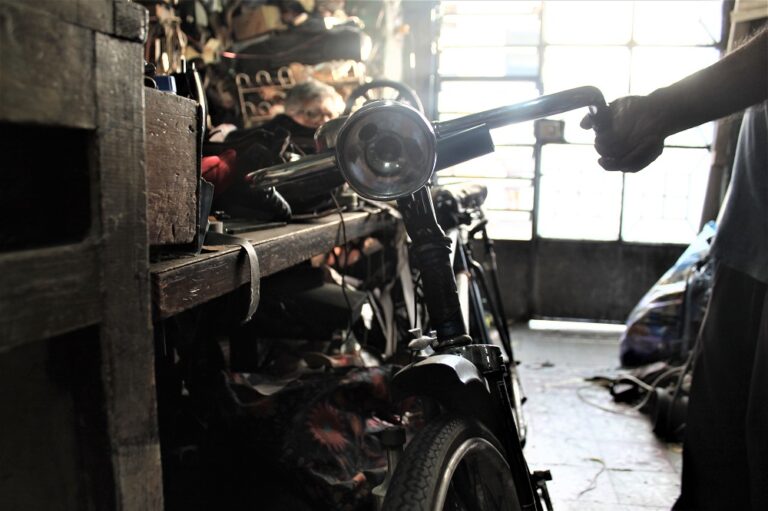
The authorities don't always see the benefits of bicycles. Several years ago, the mayor gave orders to the police to cut the locks off every bicycle on the street and take them away. The mayor was Fuentes Alcocer. It was a terrible thing, the mistreatment of bicycles! I heard about a lot of people who had their bicycles taken away in a very arbitrary way, and then the police denied it. That was theft. Even nowadays, sometimes they go around cutting locks, but when Fuentes Alcocer was mayor, it was a disaster. Even if a client came and propped their bicycle outside, the police would come and say, "Get that out of there!" It was shocking.
I protested. I wrote a letter all on my own and went to give it to the mayor the day he was going to inaugurate the Sunday bici-ruta (bike path). I believe that the bici-ruta was made only to disguise the ongoing persecution. The idea came to me on Wednesday or Thursday, and on Friday afternoon, when I finished work, I took to the streets. I went to people's houses, and I went into stores, asking if they would sign the letter. I gave the letter to them to read, and they signed it. By Sunday morning, I had already collected about 120 signatures, and on the bici-ruta, I managed to collect even more. I don't have the letter on me, but it was very well-written. It was published in the newspaper in August 2006, a few years before Ulises and Everardo started CicloTurixes.
That Sunday, I finished collecting signatures, and the authorities were already there. The inauguration was around eight o'clock in the morning, in el Parque de La Ermita. That's when I took the letter to the mayor. I approached him and handed him the letter. And bluntly, he said:
—"Listen, buddy, now's not the time."
Then, a lady who was behind him, I don't know if she was a member of city council or not, asked me:
—"What is it that you are giving the Mayor?"
—"May I give it to you?" I asked her.
—"Yes," she tells me, and I gave it to her, with the collected signatures.
At that moment, someone tapped me on the shoulder and asked me
—"What did you try to give to the mayor that he would not take?"
—"Who are you?" I asked him.
—"I am from the newspaper Por Esto."
—"Ah, okay, well, here is a copy."
And so, it was published in the newspaper. That gave me the idea of taking the letter to other newspapers, but they didn't publish it. However, it did cause a scandal because a reporter from a radio station who is very well known here, José Luis Preciado, interviewed me.
That bicycle you are photographing is a Falter. It's German-made. There's the logo; look: it says "Falter." It's from the 1940s. Falter means "butterfly" in German. I've got another one back there that took first place in the antique bicycle contest here in Mérida. It's a Rabeneick. Look, here's the announcement they made in the newspaper: "It's a treasure on wheels. A 1952 German Rabeneick, owned by Gerónimo Borges Zapata, wins 'La bici antigua' contest as part of the second anniversary of the Bici-ruta. August 18, 2008."
The organizers of the contest were curious about how I won. The newspaper advertised the contest for about a month. Then, on the last day, the last Friday at night, I went to the courtyard and took the bicycle out. I had it in a makeshift shed over there, under a piece of sheet metal. The bicycle was very dusty when I took it out. I took it apart and gave it a good clean. My wife came home from work and said:
—"Hey, what are you doing in the courtyard?"
—"I'm cleaning the bicycle," I tell her; "I'm going to use it for a contest."
—"You're using that piece of junk in a contest!"
—"Well, even if it doesn't win, this 'piece of junk' right here is going to come in at least second or third."
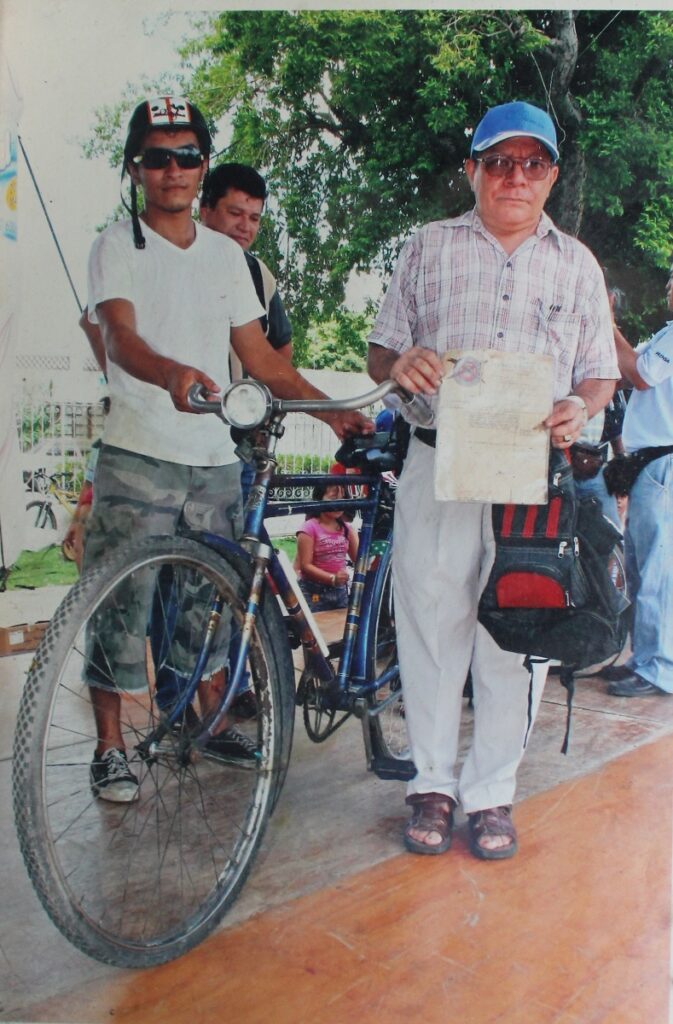
Photograph: Por Esto, August 18, 2008
It won first place. Why did it win first place? Because nobody brought a certificate of authenticity. I have the bicycle's certificate in my hand in that photo there. Not even the lady who was shouting that her bicycle was a hundred years old could win because she had no way to prove it - and because her bicycle was not a hundred years old. It was a Panther, German too. Very pretty. She yelled, "That was my grandfather's; it's a hundred years old!" And I told her, "Let me tell you something. That bicycle is not a hundred years old." I know what a Panther that would be a hundred years old today looks like. It has certain characteristics - but not that bicycle. And another thing, it was modified. The front-wheel had a striped dynamo in the center, which is English-made.
But the problem here in Mérida is the obstacles that the authorities put in place. I don't know why they don't give bicycles the promotion they deserve. For example, there's Everardo, who goes to meetings and explains to them the importance of bicycles... but everything remains at the planning stage. Or the authorities flip-flop; they put bike lanes that are useful one moment but then allow automobiles to travel in them. Then on Sundays, they allow people to use the bike lanes to sell their useless trash. They have their tables set up, and you can't pass through; you have to bike out in the street.
Yes, we are all human beings, but I see that those who drive become something else; they're more aggressive.
Another thing, now some council members want to re-plate bicycles. They were already plated. On top of the plate, you had to have a bike license. I'm going to see if I can find one and send you a photo. If you didn't have that license or a plate, the police would take your bicycle away. It was a hassle. It was like that until 1990. I remember the year because of something that happened to me. One day somebody called my phone at midnight. It was my mother-in-law; God rest her soul. She was returning from a trip and said, "I'm at the terminal. Can you two come and pick me up?" I told my wife, "Let's go get her." My wife had a bicycle. She got it about twelve years ago. It was hung up over there; a 26-speed Windsor. I bought it for her brand new - I even have the receipt. "I'm too lazy to bike. Take me on the rack," she said. I got the Rabeneick, and we set off; my wife was eating an apple. We got to the corner of 56th ("eggplant corner," as it's called). I had a red light, but since it was midnight, and there was nobody around and no cars on the road, I didn't stop. At that moment, I saw the patrol car that was turning. I told my wife:
—"Now, watch this. They're going to stop me."
—"What?"
—"Yes, they're going to stop me," I told her.
When I reached the end of the street with Monte de Piedad, the patrol car arrived, and "boom," it blocked my way.
—"Hey, you ran the stoplight!" the officer said to me. "And you're also carrying someone else."
—"Yes, I am carrying someone else. Yes, I am breaking the law. I'm not going to argue otherwise. Give me a ticket, and I'll pay it."
—"But your license plate is expired."
—"Yes, my license plate is expired. It is from 1990, but I'll be one of the first ones in line to get my license plate when it becomes available. Has the newspaper announced that the plates are available yet?"
—"No, but you are still carrying another passenger."
—"Yes, that's correct. I am carrying another passenger, but my bicycle is registered with the police. Take my license plate number and my frame number. Give me the ticket, and I'll pay it."
—"No, we're going to take the bike with us."
—"And why would you do that? You want to confiscate it."
—"Well, get lost, then!" he said. He climbed into the patrol car, and they drove off.

The city buses pose a challenge too. Those are the worst - along with the public service vans. I hate when you are stuck between two of them, and the one behind you is going vroom, vroom, vroom, vroom, vroom. What kind of nonsense is that! If I move aside, it's going to be stuck behind the one in front; they won't be able to move forward at all. Then they honk at you - "beeeppp."
One time, I was honked at by one of the regional buses. I turned and looked at the driver as if to say, "What's wrong with you?" and he swore at me. "What about it?" he asked me. Things like that are unfair. Yes, we are all human beings, but I see that those who drive become something else; they're more aggressive. I couldn't tell you why. They want to put you down because you are riding a bike, a vehicle that some people deem worthless.
But I'm not afraid to ride my bike. I think I ride pretty well. Of course, people ask me about it. There have been two times when clients, around my age or a little older, came and asked me questions. They sat there where you are now. I always had the yellow bicycle here - the one I took yesterday to the bike meet. While I was sewing, they looked at it and asked me:
—"Hey, can I ask you a question?"
—"What is it?"
—"Do you ride that thing?"
—"That 'thing' is a bicycle!"
—"But do you ride it?"
—"Yes, I do."
—"And it doesn't scare you?"
—"No, it doesn't scare me! It's a road bicycle, that's why I ride it. It's a very smooth, comfortable ride - not tiring in the least."
I believe that bicycles build strong character. You feel a sense of community. Even biking alone, you feel free. The bicycle gives you that.
I also like the sense of community, seeing different people, and the conversations with other people that happen when you ride a bicycle. That's why I like to go to the CicloTurixes rides - it gives me the opportunity to meet and get to know the other riders. Like yesterday, we met each other at the ride, and it is a pleasure, Alex, that we are talking now. This is a group where various cyclists come together: there are some who are road cyclists, others who compete - and they have their own groups. CicloTurixes is just for the joy of the bike. I am an Extraordinary Minister of Holy Communion. I take Communion to the sick who can't go to church. Last night it was my turn, but I finished early because I didn't want to miss the nine-year CicloTurixes ride or all of the fellowship that took place.
I believe that bicycles build strong character. You feel a sense of community. Even biking alone, you feel free. The bicycle gives you that. I never worried about driving. I didn't think it was necessary. Once, my brother-in-law said to me, "Let's buy a car. We'll go half-and-half." The two of us bought the car, but he drove it. I don't know what happened - I don't even know what he did with the car. One day my wife said to me, "Hey, but that's ours." "Yes," I told her, "but what's done is done." He sold the car; put it in his name - I don't know, I didn't even worry about it. I've never cared about cars, and since my work has always been here in El Centro, I don't need anything else. The bicycle is enough.
Share this story
Colaboradores
Entrevista y redacción: Alejandro Zamora
Revisión: María Ávila
Fotografía: Alejandro Zamora
Traducción: Hannah Wilson
